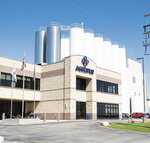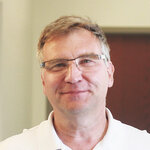


LUXEMBURG, Wis. — Farmers shipping their milk to Agropur’s Luxemburg plant are key contributors to the more than 2 million pounds of mozzarella and provolone made weekly at the 85,000-square-foot facility.
“We really appreciate the relationships we have with our producers who ship to us,” said Keith Braun, director of farm sustainability, cream sales and milk procurement excellence at Agropur. “We wouldn’t be here without them. It’s a relationship we cherish a lot.”
Agropur was the last of three stops Oct. 26 on the Professional Dairy Producers Dairy Processor Tours.
Agropur Dairy Cooperative is headquartered in Quebec, Canada, and its U.S. headquarters are located in Appleton. The Luxemburg facility is one of three Agropur plants in Wisconsin and one of seven in the U.S. In addition to cheese, this site also makes whey protein isolate, permeate, whey protein concentrate, pro-cream and deproteinized whey.
“We make the world’s best provolone here,” said Jim Schuster, plant manager. “We enter one cheese contest every year and always seem to take first, second or third place.”
Other Agropur plant locations in the state include Little Chute and Weyauwega, and other U.S. plant locations include Iowa, Minnesota, South Dakota and Idaho. About 350 farms ship their milk to Agropur across all of its plants. Wisconsin plants take in milk from 220 farms. The Luxemburg plant receives milk from 70 producers.
The plant receives 3.5 million pounds of milk per day and makes 350,000 pounds of cheese daily. Milk enters one of six silos, each with a capacity of 70,000 gallons. Intake occurs 14 hours per day, and milk is processed 20 hours a day. At the end of the day, the silos are emptied.
Braun said that 90% of the milk is sourced within 30 miles.
“The furthest we’ll go out is 40 to 45 miles,” Braun said. “We’re picking up milk closer than we used to. We used to go 90 miles for a lot of milk.”
The Luxemburg plant was built in 1948 and was purchased by Agropur in 2008.
“Agropur made a big investment here — the biggest they ever made as a company,” Schuster said. “It was a $120 million investment in this plant. They’ve been a great partner.”
In 2014, the plant tripled in size in response to an increase in milk from area farms.
Agropur spent over $100 million to accommodate that growth. The five-story facility is technology-driven and built with automation in mind. As a result, fewer employees are required. The plant operates 364 days per year, 24 hours per day and employs 170 people.
“We’re in the middle of farmland, and the work ethic in this region is incredible,” Braun said. “Plants located in cities struggle a lot more to find help than we do.”
Cheese is made into cylinders or round logs, 4- by 4-inch squares or 20-pound squares. All of the cheese made at the plant is known as pasta filata, meaning it is cooked. After the cooking process is complete, cheese enters a salt brine for five hours at 40 degrees.
“As it cools, the cheese absorbs more salt,” Schuster said. “We use 6 tons of salt every day.”
Cheese is tested for fat, protein and salt content, and in the test kitchen, cheese is analyzed to see how it stretches and performs. Cheese is vacuum sealed and shipped on returnable trays to protect it from molding.
All of the cheese Agropur makes is sold by private label. Therefore, its name does not appear on any packaging.
“A lot of the mozzarella and provolone you buy does come from this plant; you just don’t know it,” Schuster said. “If you eat breaded mozzarella sticks, there’s a high probability Agropur cheese is in there.”
Milk comes in at 4% butterfat or higher. The cream is separated and added back in proportion to the product being made. Agropur sells the extra cream and markets 100 truckloads of cream per week among all its locations. Two loads of cream are shipped daily from the Luxemburg plant year-round with about 90% of the product staying in Wisconsin.
Whey is also turned into a saleable product after going through a whey separator to remove the fat.
“That’s the cream we sell to a butter maker, and it is pasteurized as well,” Schuster said. “We remove proteins from the whey, and what’s left are solids like lactose and permeate that get dried down and condensed and sold also. A lot of our permeate goes for animal feed.”
The plant also features a store for selling fresh dairy products and offers cheese not only from Agropur but from other processors as well.
“That’s the neat thing about the dairy industry,” Schuster said. “We’re all competitors, yet we work together to promote the dairy industry and support each other.”
Comments
No comments on this item Please log in to comment by clicking here